October 2023 Iris Malawi Update
This has been a season of devastation and destruction in Malawi. Infrastructure was badly damaged when cyclone Freddy struck on March 12, 2023. This cyclone traversed the southern Indian Ocean for more than five weeks making it the longest lasting tropical cyclone ever recorded worldwide. The only road connecting Bangula to Blantyre became impassable when a bridge was completely washed away. We were stranded for two weeks until a temporary diversion road was constructed. Once again, God prepared us for the disaster. We had received a container of Mannapack (rice/soy meals) at just the right time, and we had water to provide to the people at displacement camps until a clean water supply could be sourced. Our Bible School teachers quickly mobilized teams to go and visit the displaced people in camps to bring comfort and encouragement through the Word.
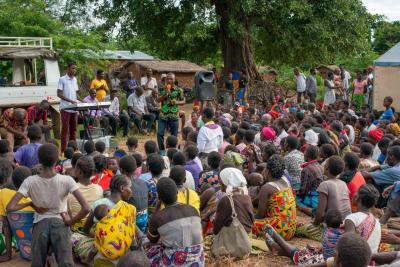
[Bible School teachers ministering at one of the many displacement camps.]
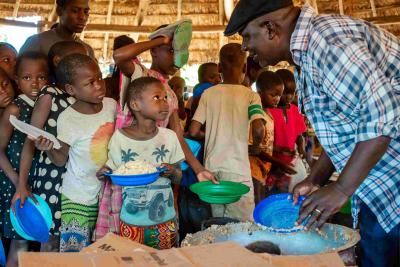
[Pastor Ali serving a cooked meal to displaced children.]
We had several visitors who came at just the right time. Andrew was available to help pilot rescue boats to rescue people stranded as the water rose around them. Michal, an Iris missionary in Nelspruit, came at just the right time to encourage and strengthen people with his passionate preaching. It was a pleasure to partner with Médecins Sans Frontier who arrived to provide infrastructure and medical care in the camps.
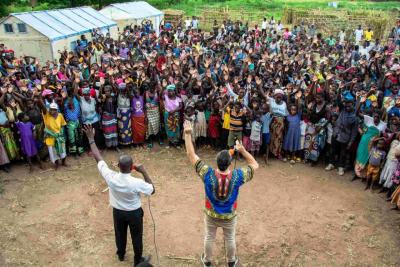
[Michal capturing the attention of a crowd at a displacement camp near Mbenje.]
Easter Sunday took on fresh meaning as people gathered to worship despite incredible need in their villages. Many have lost homes and fields, and their only hope is in the reality of Christ in us and with us. It was our pleasure to have Rebekah Martin visit us over Easter, bringing comfort and joy. We particularly enjoyed showing Rebekah our new Prayer House, built to overlook the fruit orchard. We built this place of prayer for pastors, children, parents, missionaries, and visitors. Working in a new medium (stone), our brick masons were able to learn some new skills on the job. We are excited about the potential for unity and direction as we pray together. You enter the prayer house through the cross and exit into the fields, and that is a picture of how we choose to live each day.
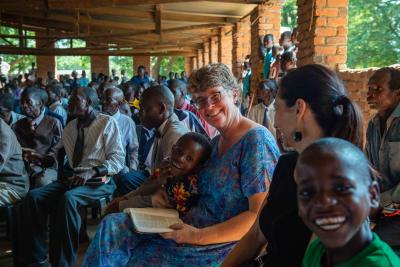
[Easter Sunday service in Bangula.]
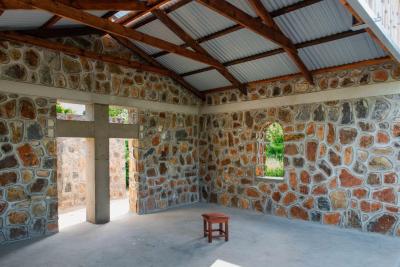
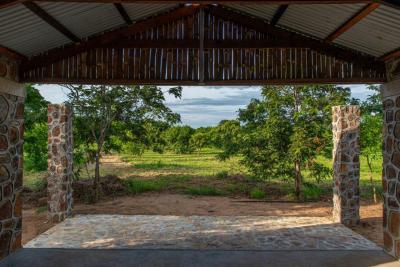
[The prayer house located adjacent to the Iris mango and citrus orchard.]
In May we welcomed Peter and Brad who came to help our Iris Malawi Team think through some of their fears about the future and look towards some of the opportunities ahead. We had a fantastic week together, working through Joshua 1 and considering God’s words to Joshua, ‘As I have been with Moses, I will be with you.’ Joshua faced an immense challenge, following in the footsteps of Moses, but we were reminded that God’s work is not dependent on a particular man or woman. His work is his work, and he will continue it.
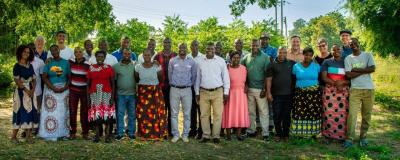
[Peter and Brad together with the Iris Malawi leadership team.]
At the end of May, we made our way back to Canada to have some rest and prepare for the next season. As we prepare to take the leadership of Iris Ministries Canada, our role in Malawi is shifting. We are so grateful for an incredible team in Malawi and for many friends who continue to stand with us in ministry both in Malawi and in Canada.
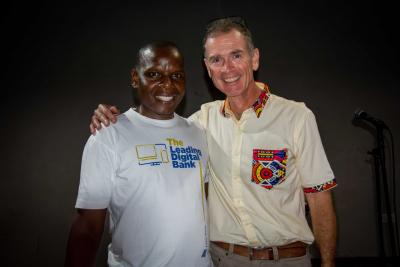
[Timothy Makwalo together with David “Mo” Morrison. Timothy is the director for the Iris Malawi base.]
Iris Malawi Cerebral Palsy (CP) Program:
The Cerebral Palsy (CP) group continues to grow in numbers. While this is sad because it reveals the large number of children with CP in our community, it is also wonderful that these families are finding support and encouragement. When we reached 150 families, I sat down with a volunteer physiotherapist and Ziwone, one of our Iris house mums who has been helping me. We talked about the difficulty of connecting with each child in such a large group. With encouragement from another local physio, we decided to break the large group into small community groups. These groups meet weekly or bi-weekly in their villages, providing support and encouragement to each other. Some parents did not like the new format and have opted out, but most have stayed connected. We have seen tremendous growth in relationships and even the health of the kids because they are getting more regular encouragement. It is also wonderful to see the CP families demonstrating to their villages the value of these children with Cerebral Palsy.
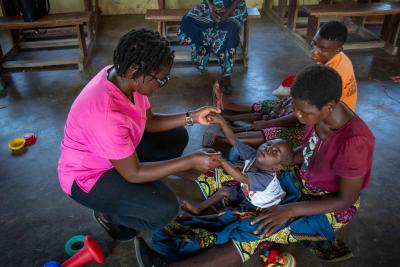
[Esther the physiotherapist (in pink), together with the CP support group at the Iris base in Bangula.]
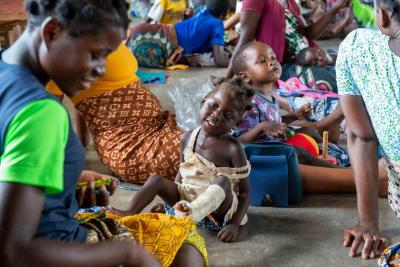
[Children and caregivers finding encouragement at the CP support group.]
Iris Children’s Homes:
Twenty years ago, we started our first children’s home. We found house parents for each home and started bringing children home, mostly between the ages of 5 and 10, but there were a few babies and a few teens in the mix. Every child was given a bed in their home that would remain their bed until they no longer needed it. We eventually built seven homes instead of dormitories because family is so important. It is hard enough to build a family when you give birth to every child; bringing unrelated children together with unrelated house parents requires extra grace. Every parent has strengths and weaknesses, and every child responds differently to those. It has been our joy to watch as unrelated people grow into families and learn to love one another. Many beds are empty now as their occupants are mostly away at Secondary School or College. On the holidays, when everyone is home, the volume goes up, and the rooms become more crowded.
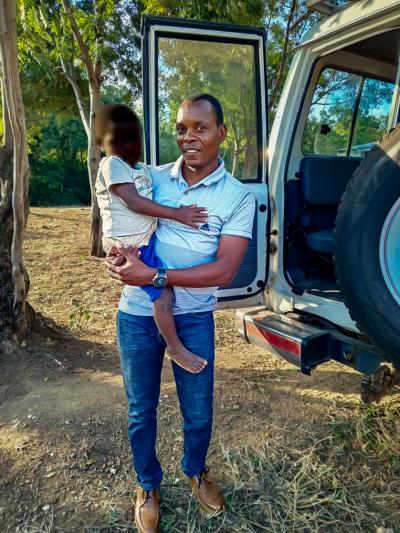
[The head of Iris Children’s Homes, Patrick Mostishu, together with a young boy who joined the Iris family in September this year.]

[ Joanna playing a game with house dad Foster and some Iris children.]
Over the last few months, many of our Iris children have graduated from their homes, having finished their education. This involves family visits, restoring broken relationships, finding work, creating business, or simply returning to ‘their village.’ It is scary and exciting. Change is never easy, and this change is particularly fraught with challenges. Iris children need to adjust to a culture in which women are not always treated equally, in which your mother-in-law is all-powerful, in which marriage is fragile, and motherhood is often a lonely road. Some of our Iris graduates are thriving, and others are struggling, but we believe they are all capable of contributing to their community.
As the homes empty out, we face a different dilemma. Do we start again? Filling homes with little ones who are without families. We could. There are many children in need, but the situation is not as dire because HIV medicine is so effective and medical care in general has improved. Social welfare is more inclined to support children at risk in their villages, which we do through our Children of Hope program in which we provide support to many families in the community. Our team is still figuring out what the next season looks like in our Iris Children’s Homes.
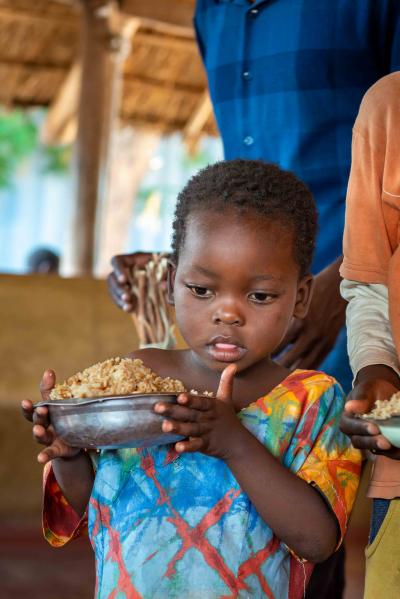
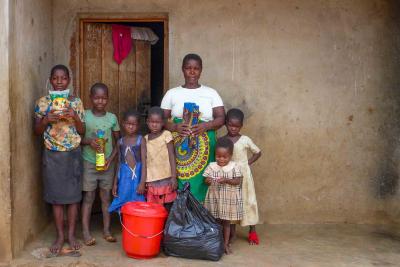
[The Children of Hope program provides support to orphaned and vulnerable children in the community. Most of these children are cared for by their grandmothers.]
Iris Primary School:
Over the last few years, with the decrease in primary students on the Iris base, our primary school has opened its doors to more and more village learners. These are children from families in the community around us. Some children even arrive by minibus every day. We currently have 170 village learners and 30 Iris learners. Our teachers are adjusting to bigger class sizes and more marking. We employ a tailor for several months each year, just making school uniforms. Many people have committed to pay school fees for the opportunity to attend Iris Primary School. It is good to be able to serve our community in this way.
The Iris Primary School has maintained a 100% pass rate since the very first group of grade 8 learners wrote their national exams, and this year was no exception. We are grateful for our head teacher, Mr. Cosmas Banda, who leads a talented and committed team of educators.
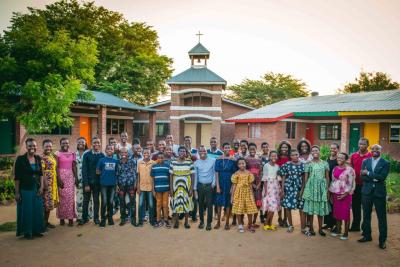
[The 2023 graduating grade 8 class, together with their teachers in front of the Iris Primary School.]
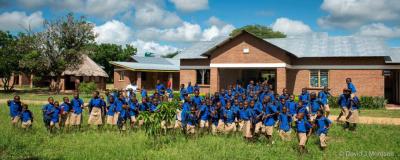
[Students ready to begin their day of learning at Iris Primary School.]
Iris Bible School, also known as Harvest Bible School:
The Iris Bible School serves Iris pastors throughout the country. With over 450 churches in Malawi and minimal training available for pastors, the Bible School is essential for theological training, as well as character building. One of the most beautiful benefits of Bible School has been an increase in faithfulness within the family. Twice a year, we open the Bible School to pastor’s wives or women in leadership in the churches. They testify that their husbands come home from Bible school more ready to serve their families and love their wives.

[Women studying the Bible at Harvest Bible School.]
Malawi received three devastating cyclones in the last 15 months, resulting in much loss of homes and fields. Our Bible School teachers were quick to get into the communities to encourage and strengthen the people, assess the damage, and communicate with the leadership about the most urgent needs.

[Pastor praying for flood victims after the devastating cyclone.]

[Bible school teachers distributing maize flour to those who suffered crop failure.]
Iris partners with Malawi Prison Fellowship and leads ‘The Prisoner’s Journey’ Bible study curriculum in the Nsanje District and Chikwawa District prisons.
Construction of a New Church:
Iris Malawi owns a second property which is located right beside the Bangula aerodrome. Construction for a multi-purpose church building began in December 2022 and is continuing in stages as resources are available. Once complete, this 6,300 ft² facility will replace the dilapidated shelter that has been well used over the years to host conferences, feeding programs, pastor meetings, and church services. More recently, this site was used to feed thousands of displaced children for weeks after the devastating cyclone.
We are grateful for the volunteer help from a Canadian engineer/architect who designed the church incorporating shipping containers for stability and storage space for emergency relief items, a structure with a high roof with good ventilation, and a stage.
It has been great having visitors come to help and supervise the design and construction of this new building. Metal trusses have been fabricated at the Joe Martin Skills Training Centre located on the main Iris base by skilled Malawians under the supervision of a volunteer mechanical engineer. We hope to have the roof structure completed by the end of 2023.



[Fabrication of the metal trusses and the footprint of the new church with containers in place and upright metal columns.]
Water System on the Shalom Property…gardens, pigs, goats:
Several years ago, we were able to expand the Iris property by purchasing a piece of land on the western side which is now called, ‘Shalom’. It has been a sanctuary for birds these last few years. Last year, we built two houses for families of our guards to establish a presence and protect the property from thieves. In May we completed the well project that includes a water tower with 10,000 litre storage capacity and a borehole with a solar-powered submersible pump system. Just weeks later this land is producing vegetables for the base, and our team has started raising pigs and goats to support the children’s homes through meat availability and profits.

[Drilling borehole and the joy of reaching water!]
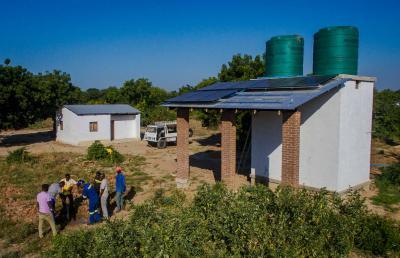
[Water tower with tanks and solar panels to power the submersible pump.]

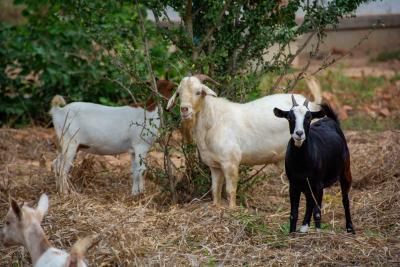

[Iris Farm with produce, goats, and pigs]
